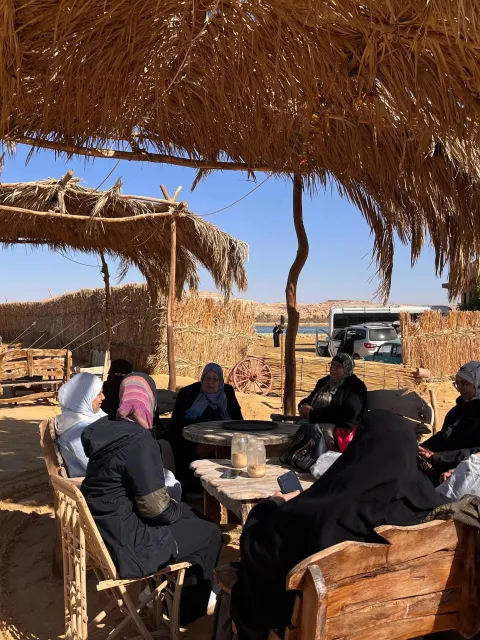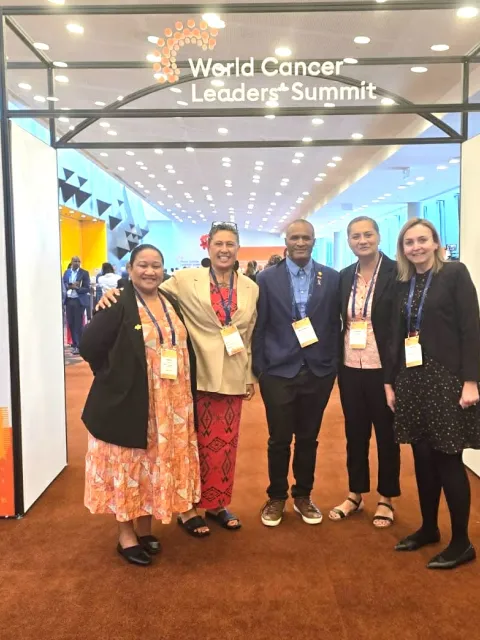Podcast "Let's Talk Cancer": the obesity epidemic – shifting away from individual responsibility

More than a third of all cancers can be prevented by having a more active lifestyle and healthier diet. Yet, public health authorities have an essential role to play in creating a favourable environment for people to eat better and exercise more.
Around 13% of adults are considered obese and 40% overweight. Once a concern only for high-income countries, excess body weight now affects people across different regions and income levels and has become one of the world’s biggest public health concerns.
Excess body weight is a risk factor for many diseases including more than a dozen types of cancer.
But too often, individuals are seen as solely responsible for their weight, and people who “obese” or “overweight” – who have a high body mass index – are stigmatised if not discriminated against. They are told to simply “eat less” and “exercise more”, and made to feel responsible for their poor health, when in truth, the reasons are complex and numerous, ranging from genetics to a low socioeconomic background and a lack of opportunity to make informed choices about their health.
Many people also live in environments where healthy foods and the ability to exercise are less available, accessible or affordable.
In this podcast, Cary Adams, CEO of UICC, speaks with Fiona Bull, Head of Physical Activity at the Department of Health Promotion, at the World Health Organization, and Kendra Chow, Policy and Public Affairs Manager at the World Cancer Research Fund International, and a registered dietician, about the world’s obesity and nutrition problem.
See podcast transcript below
Listen on: Spotify | Stitcher | Apple Podcasts | Amazon Music | Audible | Deezer
Get notified of new podcasts by email
Podcast transcript
Cary Adams: Hello, this is Cary Adams, the CEO of the Union for International Cancer Control in Geneva, Switzerland. And welcome to Let's Talk Cancer. Around 13% of adults are considered obese and 40% overweight. Once a concern only for high-income countries, excess body weight now affects people across different regions and income levels. And, according to WHO, it has become one of the world's biggest public health concerns. Excess body weight is a risk factor for many diseases, including more than a dozen types of cancer. But too often, individuals are seen as solely responsible for their weight. And people who are obese or overweight, who have a high body mass index, are can be stigmatised if not discriminated against. They may be told to eat less and exercise more and made to feel responsible for their poor health, when, in truth, the reasons are more complex and numerous, ranging from genetics to societal norms and a lack of opportunity to make informed choices about their health. Many people also live in environments where healthy foods and the ability to exercise are less available, accessible or affordable. With us to talk about the world's obesity and nutrition problem are Fiona Bull, head of physical activity at the Department of Health Promotion at the World Health Organization based in Geneva, and Kendra Chow, policy and public affairs manager at the World Cancer Research Fund International based in London. Welcome to this podcast.
Fiona Bull: Thank you and good afternoon to everyone.
Kendra Chow: Thank you, Cary. It's a pleasure to be here.
Cary Adams: Once considered really a high-income country problem, more and more people in low- and middle-income countries are seeing an increase in the body mass index of their people. So, Fiona, could you explain the physical activity angle? What are the factors that are causing this massive shift in the in the world's population?
Fiona Bull: You raise a very important point in your introduction. It's complex and it's multifactorial. So, like obesity, we're seeing very concerning trends. Physical activity has not increased globally over the last 15 years. A few countries may have made progress, but that's counterbalanced by countries going the wrong way and we're becoming less active. Covid has no doubt impacted this. We don't know exactly the amount, but most of us know personally that it's been harder at times. It's about the availability and accessibility in many cultures. It's the cultural values and norms about who could or where can, if you're too old or too young, or if you're female. So cultural barriers, economic barriers, environmental barriers. And then there is some education and value and motivation. And you put that together and shifting behaviours is quite difficult. But that's what we're here to talk about.
Cary Adams: Thanks, Fiona. What about yourself, Kendra? What about the nutritional side? What's going on around the world?
Kendra Chow: So when it comes to ultra-processed foods, we know that they are consumed in high rates and high income countries like the UK, US, Canada and Australia. But these foods are now being spread more globally thanks to more industrialisation of food systems, advances in technology and globalisation. So this is what's known as the nutrition transition. In low- and middle-income countries there's a shift away from traditional diets and towards increasing intake of ultra-processed foods that are linked to obesity and development of non-communicable diseases. So based on current sales and consumption trends, intake of ultra-processed foods is projected to increase in every region across the globe. In these areas where intake is currently low, these are key areas for potential market growth and increased revenue for food corporations. Especially in middle income countries like Brazil, China and India, where there's a large portion of the world's population, this shift in dietary patterns will have a large implication for global health, especially as it relates to increasing rates of obesity, overweight and predisposition for the development of non-communicable diseases.
Cary Adams: We're aware that there are many companies that are very aggressive promoters and marketers for what I think most people accept to be unhealthy foods. So what exactly are are they doing? How do they do that? How have they moved into these other parts of the world to sell their products to vulnerable populations?
Kendra Chow: Commercial entities do have the capacity to be positive, but we do have this established evidence base now that shows that some corporations, especially, you know, some of the largest transnational and multinational corporations, are having an increasingly negative impact on human and planetary health and the scale of their power is impressive. Some corporations have profits that are larger than a whole country's GDP. They're really driving some of the world's largest health problems, especially in the increase of NCDs, including cancer, particularly products from four industries: tobacco, ultra-processed foods, fossil fuels and alcohol. They account for a third of global preventable deaths annually.
Cary Adams: Kendra, Can we just build on the challenge we have with what they call the commercial determinants of health and also the social determinants of health, you, the poorer populations being vulnerable to those commercial entities that wish to sell and promote their products.
Kendra Chow: Persons of lower socioeconomic status often face higher stresses. So that's lack of income, time, finances or frequently a combination of these factors. And when we think about nutrition, you potentially have less money to buy nutritious food or time to prepare a healthy meal. You end up reaching for what is readily available and affordable. And as our food environment currently exists, this leads to that higher ultra-processed food intake and predisposes you to diets that are higher in fat, salt, sweeteners and other ingredients that are not nutritious. And so it has been shown that these industries, including ultra-processed food industries, do target their marketing at minority groups who already consume these products at more harmful levels or have a lower knowledge about the harms and a specific example is that in the US it has been shown that sugar-sweetened beverage industries increase their marketing at retailers around the time that food stamps are distributed and this sugar-sweetened beverages actually account for about a 10th of food stamp purchases. Prevalence of overweight and obesity in these populations is almost at 50%. And this is this is not by accident. Sugar-sweetened beverage manufacturers have spent millions of dollars in lobbying efforts related to food stamp programs to maintain and potentially increase the stream of revenue.
Cary Adams: Fiona, switching to you, the the role of the private sector in physical activity, what about the sports manufacturers and people like that? Are they are they equally promoting the flip side to the challenge, which is to get more people walking, running, involved in sport?
Fiona Bull: There is an industry that has convergence in the agenda to encourage people to be more active playing sports, buying equipment and attending the venues and the facilities which we use to enjoy and participate in it. So we're talking the manufacturers industry but also the gyms and clubs and the places we go to. And some of those can be in the entire sort of for-profit economic market. And some of them are hybrids because they're in fact partnerships with local governments to run these expensive facilities like our swimming pools and and local recreation centres. I'm very pleased to say to you there is increased awareness of that convergence, that win-win. There's also a recognition of needing to do more to get more people participating. So we encourage those who have perhaps relapsed in the in the behaviour they were active, they used to play sport but no longer and encourage them to come back. The sport industry can't do it alone, though. Who has been holding dialogues with the sport industry to encourage that greater recognition of their role? The UN political declaration on NCDs called for engagement of all sectors and specifically the private sector, as well as the civil society. And indeed sport was in the SDG agenda itself. A whole paragraph on the value it can make, not just to the physical health that we speak of, but mental health, promoting good mental health and then through physical activity. And I give the example of walking and cycling, we can contribute to some of those other agendas like air pollution and climate change.
Cary Adams: And Fiona, from your perspective, what's role of the government in in physical activity because, you know, making spaces available for children to go and play and have football pitches and the issue of air pollution in cities, what role can they play?
Fiona Bull: Choices have to be put in place that I can choose to cycle or walk or multi mode with the combination of bus and train as my needs arise. Or I can choose to go to the local community and find a place for walking, playing sport or active recreation. Some of this is in influence by by national government and I think there's always a role for setting the direction. But the actual jurisdiction may well be at a city or even a local government. And we're increasingly moving from talking about promoting to actually using the word protecting because it's about protecting some of the spaces we have as they're under threat for further infill and development that can be school playgrounds or the local park being sold off for other purposes. And we want to enable we want to enable people to have the choice to do the the active option when appropriate and when they choose to. We do need to make sure people have the right information properly informed about physical activity. And let's take, for example, the prevention of cancer. We know the evidence is strong, that moderate intensity, intensity, most people will feel quite comfortable, a brisk walk, a pleasurable cycle, a comfortable swim or whatever is your choice of activity. Is beneficial for preventing, but we have to make sure people have that. Otherwise, they're misinformed about what they need to do, which can be a barrier. They think it's more often higher intensity and leads to unpleasant feelings. And we've got to shift that knowledge so they are informed about this. And again, good information about the benefits across all ages and good information about the variety of ways and settings you can be active.
Cary Adams: Really good point. The role of the government in the food and nutrition space, Kendra, is slightly different, obviously, and things like labelling and information being provided on the product itself is one step. But what else can governments do to counter some of the marketing activities or labelling activities of the private sector, when it is unhealthy foods.
Kendra Chow: It is really important to strengthen the mechanisms that enforce accountability and demand that increase transparency from the food industry. So this involves implementing government led mandatory restrictions, as you mentioned, the marketing regulations, making sure that they also cover traditional methods that we've seen in print and television, but also these non-traditional methods that are emerging, such as online marketing through social media, all of these new platforms that the corporations are able to use nowadays. And it's also really important that governments take steps to protect children up to and including age 18. Children are particularly vulnerable because companies want to target them for developing their preferences at an early age and even developing brand loyalty. And it's really important to limit their exposure across media and settings. And it's also really important for governments to be very well prepared to counter industry opposition to food policies that they may want to put in place. So these are actions that industry will take, such as political lobbying, engaging in marketing campaigns that oppose this regulatory action and advertising to the public, all of the potential negative implications that that could have. And really governments need to take these steps to avoid industry interference. It is important as well to take a look at lack of political support, lack of awareness or understanding that advertising or marketing is an issue within the government itself. Lack of monitoring measures for compliance and enforcement and new forms of those marketing, as I mentioned. So it's really important to be aware of these barriers at the outset and start to integrate that planning as they implement these policies.
Cary Adams: In another of these podcasts, we've talked about tobacco control and the Framework Convention for Tobacco Control and how important that's been to society and governments to give them the the leverage to actually refer to WTO best practice recommendations, but also have a legal requirement to implement some of the key policies which we know, over time, reduce the amount of people who actually smoke. In this space, Fiona, when we're talking about obesity and we're talking about physical activity and nutrition, there doesn't seem to be the same political leverage through a legal vehicle like the FCTC. So in your discussions with Member States from the World Health Organization, are you making recommendations, guidelines? Are you getting them to support resolutions? What is it that you can really do to leverage change at the government level?
Fiona Bull: You're right. We don't have the lever of the FCTC. In contrast, we we have a suite of evidence-based policy recommendations about how to enable support and protect the places and then the activities that can increase physical activity. For example, physical education in schools - we call for it and it's a policy recommendation. In fact, the set of policy recommendations for physical activity are in the Global Action Plan on Physical Activity, which was developed and launched in 2018 and takes us to 2030 with a 2030 target of 15% improvement in levels of physical activity at the global level. We do, however, within that set, have the beginnings of, and I think strengthening, set of regulatory tools and policies and standards. So for example, in the area of spaces and places, we are recommending the provision of walking and cycling networks and the design of the street networks and walking and cycling networks to meet standards that will provide the safety that's required. It's not nice to have a safe pavement, it's a must-have. And so we've got to move from just recommending and suggesting to actually requiring. And there's great convergence here because in that area of those regulatory tools and specifications, they entirely align with healthy cities, air pollution reduction, congestion reduction, climate change mitigation and better places and sustainable environments. So we are very much working within those combined areas and saying these are win-win-win policy regulatory tools we must use. And if you'll allow me, Cary, we've started to measure and monitor those until we start measuring those actions that we are recommending and we're beginning to count and monitor. And we released our first global status report on physical activity, where we literally counted how many countries are doing the recommended policy actions.
Cary Adams: Which is super, because at the end of the day, we have to measure progress, if we'd hit that 15% number that you mentioned earlier, Kendra So Fiona's activity is going to encourage governments and city leaders to put in cycle paths everywhere. How do we stop them putting drink stops every so often with Coca-Cola being available? How do we stop that? What are the recommendations that you make through World Cancer Research Fund International to governments and leaders of cities, for example, on how they can pursue the right policies that will affect the way in which people can get access to unhealthy foods.
Kendra Chow: A really helpful database that the World Cancer Research Fund International has is our nourishing policy database. It's a really fantastic database that has examples of policies that have been implemented globally to address these exact issues from, you know, if it is at a national level all the way down to more localised levels as well, because at that local level, it can be, you know, zoning. Are we considering, you know, the density of fast food and convenience stores around schools? Are we considering how many grocery stores that provide access to vegetables and fruits are available, or have we created food deserts where we only have these fast food restaurants or just general lack of access to healthy foods and then expanding that all the way up into more national movements where it comes to encouraging manufacturers to reformulate products, as we've seen in the UK with the sugar-sweetened beverage industry levy and also if it's policies that encourage changes in trade, food labelling that we see all of these larger sort of impacts. So it is definitely an excellent database to take a look at for examples of what policies have been implemented and lessons learned as well as successes.
Cary Adams: I'm sure people will look it up. Fiona I know we started off this conversation saying that it's not really an individual's responsibility, but in part it is. I mean, you know, I'm sitting here as a 60-year-old man. I could walk back to my flat tonight or jump on my moped, and I jump on my moped. That's a decision I'm taking. So what is it you would you think we can do to encourage individuals to probably choose the right thing if it is available?
Fiona Bull: The data say, you know, 1 in 4 adults are not active globally and that can reach, you know, 1 in 2 in some countries. So half of some national populations are not choosing often enough or are not enabled often enough to to be active in ways that are convenient and affordable. So we've got to lower the barriers and we've got to provide that motivation. And what we do know is that being active with friends, having other benefits, is more likely to keep that behaviour change. You know, it's a hard ask to invite an individual to not do what they're preferring to do and go out. So we have to make it the preferred choice. And people prefer being active when it's fun and enjoyable. They feel satisfied, they're rewarded by it and they feel good. And so we've got to focus on providing those opportunities because that will then create the habit. And from the habit you can get more physical activity. And we know lots of people try at the beginning of the New Year, lots of people try when they see something new, but they're not sustained. And that's where I hope industry and the providers of programmes, services, gyms, clubs, coaching, sports at all levels will will look and say it's all about getting more people playing more often being active more often. It does come down to the individual motivating them and providing them with the rewarding experiences.
Cary Adams: You said that there's movement in some corporates in the right direction. Kendra, perhaps I could ask you, we're familiar with a lot of the companies that produce the unhealthy foods. Are you seeing companies themselves move towards healthier alternatives or is that just cover?
Kendra Chow: I really appreciate this question because it perfectly highlights a common tactic that unhealthy commodity industries use. And what the research shows is that we can't rely on industry to self-regulate. Very often these policy substitution strategies that corporations engage in are voluntary proposals that are used to avoid the introduction of mandatory regulation policies. So it is very often exactly as you've mentioned, Cary, that it is, you know, public-facing promotion on their efforts, highlighting their concern for issues like food labelling, concern for marketing to children for the obesity epidemic. But these often don't result in actual changes to their product or their marketing strategies. And another tactic as well is that very often these industries will shift the blame away from their responsibility and put that on someone else. So that's where you will often see, you know, the prime example of Coca Cola, you know, pointing. It's not sugar-sweetened beverages that are contributing to the obesity epidemic, but rather a lack of physical activity. So then they pour a lot of money into, you know, promoting sports, sponsoring events, funding research in that area as well. It is always important to consider, is it a genuine improvement or is it a corporate social responsibility tactic meant to deflect attention away from their contributions to the problem?
Cary Adams: So Fiona, sounds like many companies are moving towards you and looking at physical activity as the way to get off the hook to improve the quality of their food? I mean, do you feel that, Fiona, do you feel that you're being used sometimes by companies?
Fiona Bull: We certainly have seen across the world the the promotion of sport as a tactic by some industries. And we know that sport has used the sponsorship from a variety of industries, but in particular it's notable some of the the food industries, fast food providers are sponsors of sport, community sport, elite level sport, school sport. That is a concern for the very reasons that Kendra has outlined throughout this this conversation. It exposes children to conflicting messages and it certainly creates the the awareness of the product and then brand association. I think there's a success story about eliminating tobacco sponsorship of sport, but there's a long way to go in looking at the other sponsors. But to be fair, there's also needs to be a replacement. There needs to be a funding model that makes sport still available. And the biggest barrier at the moment is where is that other funding funding source going to be? And replacement through levies and taxes is one way to do that. And I do see a shifting of focus to this area as an increasing importance.
Cary Adams: Let's talk about the future, Fiona. I mean, I've known you for a number of years and your enthusiasm always tells me over on the subject matter, are you at this point in time enthusiastic that we are going to make strides towards a more physically active world and therefore, hopefully as a consequence of that, a world which has less disease, including the cancers?
Fiona Bull: I do see the positive side. I do think we're at a tipping point. I say that because some of the important platform that we needed clarity on the health benefits of physical activity, the breadth and depth of those benefits, alignment with the contribution to the other areas situating physical activity and its contributions of the policy actions, as well as the behaviour to other multiple important global challenges and priorities as laid out in the SDGs. A tipping point. Because we're tracking data, we can report back, show progress, but I'm afraid equally and we won't shy from it show where we're not making progress. And unfortunately, I could give you one statistic which was, you know, to support why we need to do more 50% or actually just over 55% of the indicators tracked in the global status report are being implemented by less than half of countries. So over half of the indicators, about half of the countries aren't doing them yet. I called this the "cup half full" report. We've got a long way to go, but I want to finish with that. Optimism is also based on the alignment and the convergence sport industry, walking in cycling, the community, the civil society, whether it's the physical health benefits, cancer or heart disease or diabetes, whether it's mental health, feeling better, dementia, depression, whether it's children learning, whether it's the kind of communities we want to live in, everyone. And more and more often people are saying, how can we help? What can we do? And I think this is going to be a key. We've got to work better together to get the synergies, to get the alignment, to get the progress. And it's almost like a virtuous cycle. If we get the energy and the the the alignment, we'll get more impact, which will show progress, which will encourage us more.
Cary Adams: Kendra, from your perspective looking forward, are you optimistic that there will be greater regulation of the of the private sector with regard to food content, food marketing and things like that?
Kendra Chow: I agree with Fiona when she said that we've really reached a tipping point and what is really excellent is we have this building evidence base that we need to start to really tackle "the causes of the causes" here, working more and more upstream. Getting to the heart of the problem. What health and policymakers need to do is frame the discussion around unhealthy industries, especially the food industries, differently. Don't let commercial actors take the lead. We need to shift the discussion, framing it differently when it comes to ultra processed food, and especially, as we've talked about already, shifting that focus away from individual responsibility to a wider systems approach. We need to stay focused on the conflicts of interest between unhealthy commodity industries and public health. These efforts by industry are well funded and strategically crafted to shape public perception of health and public health policies. These messages are having a negative cumulative effect, but it's really important for us in public health to really recognise that these strategies that are being employed are powerful, but they can be predictable as they utilise tactics from the same playbook. We've seen this from tobacco. We've seen this in other industries as well. So we can start to address them. And by tackling them head on, we can start to build these strategies that can address them and hopefully remove that pollution of our environments and create where places where the healthy choice is actually the easier choice. We can shape that path for individuals to make those choices because taking it on that wider systems approach, it's up to that environment to help them enable them to make those choices.
Cary Adams: So Kendra, Fiona, I agree with both your conclusions. I think we are at a tipping point. I think the the younger generation, which is well below me, is far more in tune through their connections on the internet and social media to the challenges that this world faces, including the environmental challenges, but also the challenges in health. So let's hope that generation takes a lead and becomes a far healthier community than maybe we have been. Thank you very much indeed.
Thank you for listening to this episode of Let's Talk Cancer for a wider understanding of the commercial determinants of health. Stay tuned to our next episode on tobacco and alcohol. If you want to know more about the commercial determinants of health, we'd recommend Money, Power, Health, a podcast by Nason Maani. If you have suggestions, questions or comments, please don't hesitate to get in contact with communications at uicc.org or send us a message on social media.
Last update
Thursday 31 August 2023




